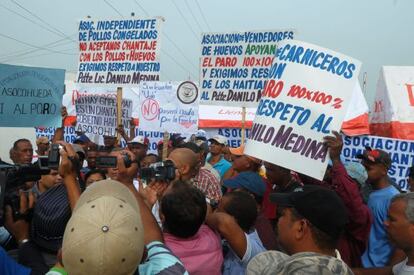Border tensions fly after Haiti bans Dominican poultry products
Haitian officials want to keep eggs and chickens out to prevent bird flu

Tensions on the border separating Haiti and Dominican Republic on the Caribbean island of Hispaniola have flared up in recent weeks over preventive measures taken to curb an outbreak of the bird flu virus.
On June 6, the Haitian government banned Dominican poultry products from entering the country in an effort to prevent bird flu from spreading. The result has been a devastating blow to Dominican farmers, whose losses have risen to more than $3.5 million in just two weeks.
In retaliation, Dominican authorities have carried out massive deportations of Haitians, operations that have been severely criticized by human rights organizations.
Foreign ministers from both nations met in Santo Domingo on Monday but were unable to agree on a solution to ending the crisis, which is expected to cause more tension along the 366-kilometer border in the coming days.
Between Monday and Tuesday, border traffic between the two countries was restricted at two of the four most important crossings. Under a treaty, bi-national markets and trade are supposed to function and flow freely without any restrictions.
“No one or anything is coming through here,” said Freddy Morillo, president of the businessmen’s association in the Dominican town Dabajón located just northeast of the border. Morillo organized a general strike on Monday to protest the blockade.
We are going to be forced to fire thousands of Haitians that work on our farms”
His counterparts on the Haitian side announced their own plans on holding a strike on Friday in Ouanamithe.
On Tuesday, Dominicans kept Haitians from crossing in the border towns of Jimaní and Malpasse in the southeast.
On June 6, the government in Port-au-Prince announced that it was prohibiting eggs, chickens and processed meats produced in Dominican Republic to stop the H5N2 virus, which is commonly known as bird flu, from spreading.
Four days later, Dominican health officials, along with a representative of the Pan American Health Organization, announced that there has not been one case of bird flu in Dominican Republic. Yet, they acknowledged eight deaths from the H1N1 virus, known as a swine flu.
“I don’t know where the government of Haiti is getting its information but up until now there have only been cases of H1N1 in the country,” said Dominican Health Minister Freddy Hidalgo.
Dominican Republic exports some 30 million eggs and 1.5 million chickens to Haiti each month, according to figures.
“We cannot continue to feel sorry for the Haitians… They have a lot more diseases than we have,” said Víctor Abreu, vice president of the Association of Egg Producers and a government advisor for the agriculture industry.
“It pains our hearts but we are going to be forced to fire thousands and thousands of Haitians that work on our farms,” Abreu told Efe News Agency.
After the foreign ministers were unable to reach an agreement following Monday’s five-hour meeting, Dominican President Danilo Medina said he would “take drastic measures” to ensure that the poultry industry will no longer have to depend on the Haitian markets.
As the crisis continued to unfold, thousands of Haitians who don’t have residency papers have been deported by Dominican authorities.
Tu suscripción se está usando en otro dispositivo
¿Quieres añadir otro usuario a tu suscripción?
Si continúas leyendo en este dispositivo, no se podrá leer en el otro.
FlechaTu suscripción se está usando en otro dispositivo y solo puedes acceder a EL PAÍS desde un dispositivo a la vez.
Si quieres compartir tu cuenta, cambia tu suscripción a la modalidad Premium, así podrás añadir otro usuario. Cada uno accederá con su propia cuenta de email, lo que os permitirá personalizar vuestra experiencia en EL PAÍS.
¿Tienes una suscripción de empresa? Accede aquí para contratar más cuentas.
En el caso de no saber quién está usando tu cuenta, te recomendamos cambiar tu contraseña aquí.
Si decides continuar compartiendo tu cuenta, este mensaje se mostrará en tu dispositivo y en el de la otra persona que está usando tu cuenta de forma indefinida, afectando a tu experiencia de lectura. Puedes consultar aquí los términos y condiciones de la suscripción digital.









































